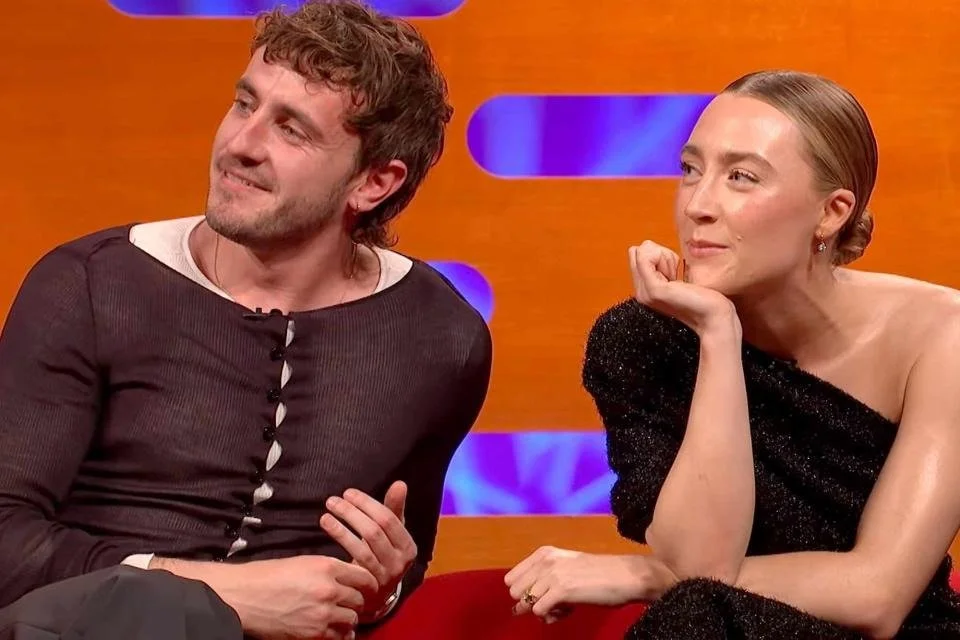Paul Mescal Is a Symptom of Male Ignorance, Not The Syndrome
For a glorious, show-stopping second, Saoirse Ronan communicated a vital point about violence against women on The Graham Norton Show in November.
Most of all, Paul Mescal exposed an accurate representation of male ignorance. Mescal’s misfortune is that ever since, he's been portrayed as the face of male obliviousness.
The scrutiny of him grates because Mescal’s quite likeable, as likeable as celebrities can be. In Normal People, he plays Connell Waldron, a character burdened by his closed perception of masculinity- and mostly through his girlfriend Marianne’s lenses, Connell sees and acknowledges sexual acts against women.
Sally Rooney, the creator of Normal People, shows Connell both shying away from and embracing confrontation. She portrays him as simultaneously courageous and cowardly— good but flawed. In other words, human.
When a school friend shows off nudes of a female classmate, Connell tries to express why this is wrong - but he lacks the self-authority to confidently express himself and trails off. In Venice, visiting Marianne, it is his roommate, Niall, not Connell, who calls out Marianne’s toxic boyfriend, Jamie, on a racist slur against Asians. Back at Trinity College in Dublin, he is infuriated by Peggy (Marianne’s judgemental “friend”) slyly insinuating her distaste for Marianne’s sex life. Connell tells Peggy to f*** off (an immensely satisfying reply) but doesn’t condemn her the way he truly wants to, continuing Connell’s narrative of avoiding conflict.
The fact he’s always addressed by his first name, never his surname, indicates that Connell is written to be likeable and relatable by Rooney. Many men similar to Connell (perhaps even including Mescal) who don’t speak out due to damaging stigmas enjoy healthy and happy relationships with women.
Is Mescal himself like Connell? There, understanding why something is right, nodding his agreement, confirming that, yes, your point IS the point. Yet simultaneously being ghostly absent in the actual discussion, wanting (and more than able) to articulate his opinion but straddled into staying silent by the dauntingness of speaking out.
Mescal and Ronan are close pals; she said after that, Mescal “completely gets” the issue of women’s safety. But, really, how can he? How can anyone who hasn’t walked home at night alone and been catcalled? Anyone who hasn't had to pause in front of their bedroom mirror and ponder whether, actually, this sparkly mini dress that I feel so fucking empowered in may unfortunately also happen to invite creeps and predators toward them? Unsolicited, of course.
Mescal isn’t in a position to “get it” because he isn’t, firstly, a woman. Nor is he a drag artist, cross-dresser or transwoman. All of whom also live with the looming shadow of male violence.
As a man, I have an unspoken, unacknowledged, undefined male security. I am less likely to be assaulted because, visibly, attackers can identify me as male.
Men are, of course, allowed to feel scared walking alone in the dark themselves; it’s an unnerving journey.
Just imagine then how much more unnerving that walk is if you’re being whistled and taunted at. Or if you are someone who understands firsthand the trauma of sexual assault. Do you find yourself regularly watching your back at any sound your brain can’t rationally account for?
Perhaps I’m misrepresenting women’s experiences.
Depressingly, I don’t believe that I am.
Last year, five of us went to a pub quiz at Ryan’s Bar on the Lisburn Road. We ambled out at around 11pm and, naturally, felt a late-night order from Monte Carlo coming on. We crossed the quiet road, headed into Monte and satisfied our cravings with, among other orders, a cheesy curry chip and salted chilli chicken wrap.
Outside, four men were walking on the footpath towards us. From their slurred speech and lurching staggers sideways, I’d guess they’d had more alcohol than us. As a group, they sauntered as though expecting their sudden appearance to magically part the waves approaching them, for us to link arms and usher them through our human-made gate.
We didn’t.
They charged through the middle of us, belligerently. As our paths crossed, a drunken “darling” was drooled in our direction.
Of our cohort, we had mixed attire: the staple jeans-and-jumper combination and a few dress-and-jacket combinations.
One person wearing a dress spun on their heel, reacting indignantly to the patronisation. As a group, we were sort of nonplussed by it. A minor blemish on our evening out. But a blemish, nevertheless. We entered a temporary tailspin during the short walk home.
Why? Why do men feel compelled and justified in this sort of behaviour? Women don’t publicly belittle men.
Which brings us back to Mescal, Ronan and the moment. As Mescal mimicked the self-defence strategy of hitting your assailant with your mobile phone, Ronan succinctly slipped in: “That’s something women and girls have to think about all the time”.
The only female on an otherwise all-male panel rested her arms on the back of Norton’s sofa, absorbing the reaction. Mescal’s face reminded me of my 13-year-old self’s horrified shock when I learnt my dad had fibbed about me getting a guaranteed snow day off school. Spoiler: I didn’t.
Mescal himself is not the problem. Men not feeling threatened by violence is good; nobody should. But... more men must challenge general misogyny and do what Connell couldn’t: have the hard conversations, educate others, and use their platform as men to positively influence other men.
As her fellow guests tried to regain their composure (desperately scrabbling to conceal the fact they’d misplaced it as convincingly as construction managers searching everywhere for the pen tucked behind their ear), Ronan added to the crowd: “Am I right, ladies?”.
The crowd’s euphoric applause indicated their answer:
Ronan IS right.
Her act also reassured anybody who’s experienced the fear of being sexually assaulted that they are right, have always been right, and that they deserve better.
Women deserve to be listened to, respectfully. Women deserve not to worry about their appearance attracting a potential predator. Women deserve that governments prioritise making spiking an illegal offence. Women deserve to walk home at night without fearfully glancing behind them. Women deserve to neither under nor overdress in case what they’re wearing provokes an illicit sexual assault. Women deserve not to have to hide either their femininity or masculinity for fear their clothes will provoke attackers. Women deserve to walk the most direct route home instead of detouring to avoid potential assailants and drunken slurs. Women deserve not to be derided on national television by the misplaced attitudes of many men, including the apparent nice guys. Women deserve to be seen, heard, acknowledged, and treated as right. Women deserve not to bear the responsibility of fixing this.
Women deserve better.
Women deserve safety across all of society.

